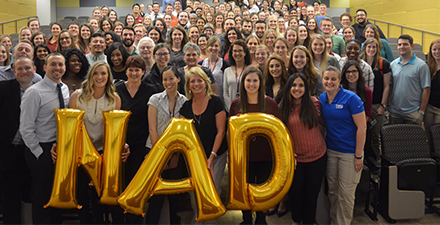APTA sections are your link to resources you need to stay current in expertise areas, and they're the best way to connect with others who share your interests — including some of the profession's most influential thought leaders.
APTA sections, some of which are referred to as academies, focus on a wide range of areas from specific specialty areas of physical therapy to broader policy areas and patient populations. No matter what your interest is there's probably a section for you.
Each month we will highlight one of APTA's 18 sections, giving information on the specialty, involvement opportunities, and sharing an experience from a current member.
The Academy of Oncologic Physical Therapy
About the Section
APTA Oncology aims to optimize movement and quality of life of individuals impacted by cancer and chronic illness by advancing physical therapist practice toward maximizing movement and wellness across the lifespan.
Section Involvement
About the Student & New Professional Subcommittee
We each have our own reasons for choosing to become PTs or PTAs. Many of us enter our programs with an idea or aspiration in mind about the kind of professional we want to become. While careers focused on orthopedic, sports, and neurology rehab are likely to be high on our lists, I think it's safe to say that aspirations to become an oncologic PT or PTA are less common. In-depth didactic teaching and clinical experiences in this area also are more rare, but it does not mean that oncologic physical therapy is any less important or in demand.
The likelihood that a PT or PTA will treat a patient with a history of cancer, regardless of their field of practice, is ever increasing. The mission of the new APTA Oncology Student & New Professional Subcommittee is to prepare students and early-career PTs and PTAs to manage the musculoskeletal, neuromuscular, integumentary, and cardiopulmonary rehabilitative needs of patients living with and beyond cancer. We aim to help you to master the "3 Cs" by becoming comfortable, confident, and competent.
Comfortable
While conditions such as diabetes or multiple sclerosis may seem more common than cancer, the fact is that in the United States, a person's lifetime cancer risk is about 40%. Approaching patients with new or unfamiliar diagnoses may be daunting, so we're here to support you in feeling up to the task.
Confident
You know more than you think! Many cancer survivors have movement system impairments that you are familiar with. We want to help you to feel confident in your abilities to evaluate for and provide effective interventions for the management of cancer-related symptoms and impairments.
Competent
Individuals with a history of cancer may have more complex cases that require a deeper and more specialized knowledge base to draw from — we're here to help you grow that knowledge and add to your clinical toolbox.
For more information about the Student & New Professional Subcommittee check out our website.
The best way to stay up to date with the subcommittee is to follow us on social media, where we'll share educational content, opportunities to get involved, and more.
Twitter: @APTAOncologySNP
Instagram: @APTAOncologySNP
Facebook: @APTAOncologySNP
We also welcome everyone to join the conversation by signing up for our free listserv.
Emma Schaberg O'Brien, SPT, is chair of the APTA Oncology Student & New Professional Subcommittee. You can connect with Emma on Twitter.
Section Benefits
Student members of APTA Oncology have the opportunity to build professional relationships with peers and leaders in oncologic physical therapy, participate in activities to further research and practice of rehabilitation in this field, and learn about oncology rehabilitation residencies and fellowships.
Members also receive an electronic subscription to Rehabilitation Oncology, as well as access to other educational resources, toolkits, lectures, quick guides, and more.
Special interest groups provide additional opportunities for networking, developing and recommending practice standards related to each area, the promotion of research and evidenced-based practice, and access to educational resources. APTA Oncology hosts these SIGs:
- HIV Disease
- Residency
- Hospice and Palliative Care
- Lymphatic Diseases
- Pediatric
- Balance and Falls
APTA Oncology participates in APTA's Early-Career Dues Discount Program, which means that if you join while you're a student you'll receive:
- A 50% discount on APTA national and section dues your first year postgraduation.
- A 40% discount for your second year postgraduation.
- A 30% discount your third year, and 20% off your fourth year postgraduation.
Section Member Experiences
"I have been a student member of APTA Oncology since my second year of DPT school and have found great value in my membership. The opportunity to collaborate and connect with other students and clinicians who share my interest in oncology rehabilitation, as well as having access to educational, evidence-based resources through APTA Oncology, has enabled me to become a more knowledgeable and confident future clinician."
— Sarah Barwig, SPT
"I value being a member of the academy for the opportunity to not only advance myself as a future clinician but also to advance our profession. Being a member of the Academy enables me to fulfill a variety of the core values of physical therapists, to empower myself as a future clinician, and to empower the community through compassionate, excellent, and patient-centered practice."
— Kaitie Toth, PT, DPT
"I've been a part of APTA Oncology since my first year of DPT school and continued as a member for my career. As a student I found great value in the resources available to me, such as the Rehabilitation Oncology journal, fact sheets, practice guidelines, and clinical internship opportunities. As a new professional, in a residency program I continue to find great value in APTA Oncology by being part of the Student & New Professional Subcommittee, being a part of special interest groups, and continuing to stay up to date with new information and evidence-based research."
— Andrew Chongaway, PT, DPT
